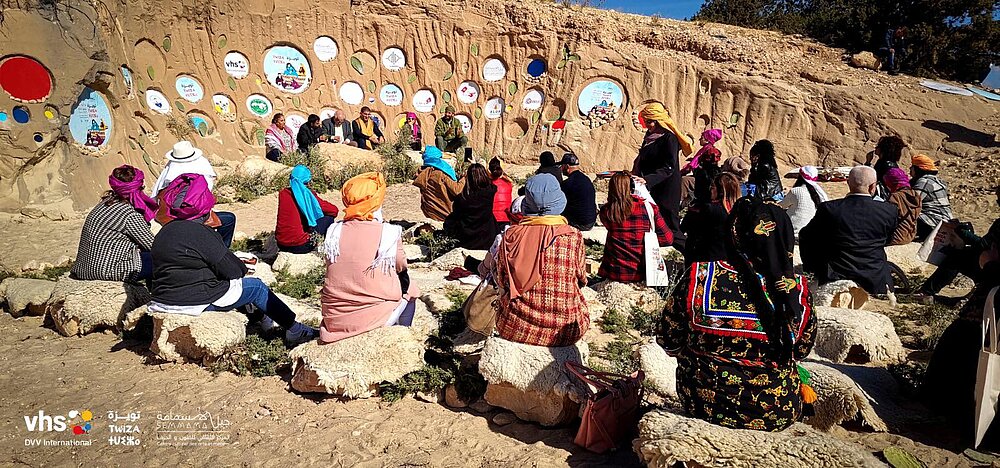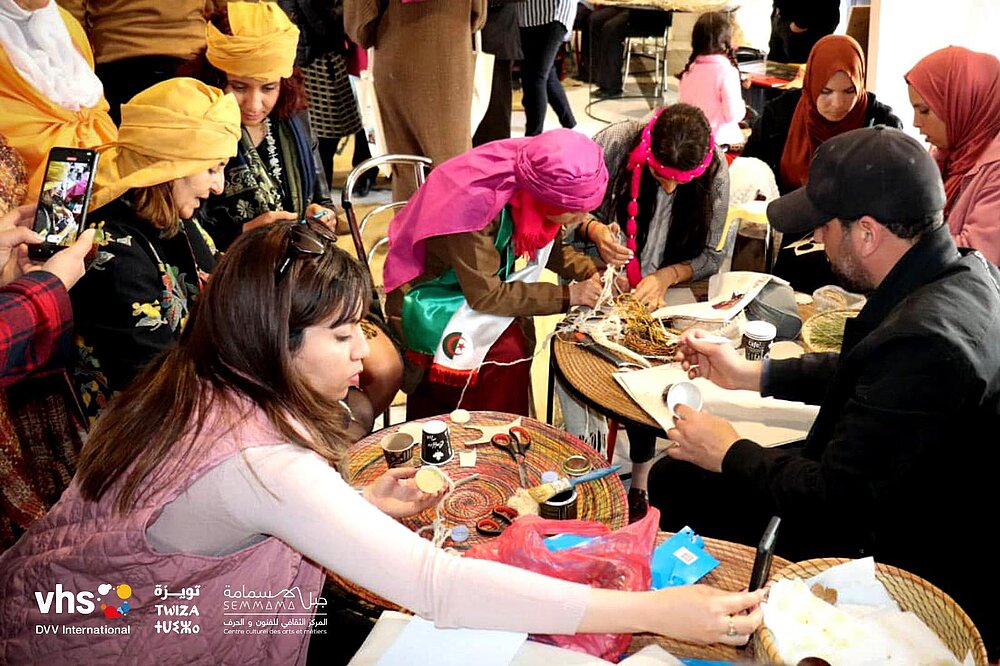DVVI and the cultural centre of Jebel Semmama recently collaborated to organize the Twiza event. This three-day activity in March 2023 consisted of workshops, reflections, shows, and exchanges. It brought together Tunisian and Algerian participants for an experience of sharing and discovering new practices and approaches. It opened with the “El Mahfel” parade, featuring mountain rhythms and bouquets of rosemary and white wormwood.
The proceedings remained true to the spirit of Twiza – which means “cooperation” in Amazigh – a Maghrebian cultural heritage. This socio-economic phenomenon has brought together communities for centuries, and its principles of cooperation, mutual aid, and sharing of resources have been key in promoting sustainable development.
The workshops at the Twiza covered a range of topics, from social design to distillation, esparto (halfah grass) and wool weaving, and the manufacture of artisanal flutes. These activities were organized in an atmosphere of community and cooperation among the participants. The workshops provided a hands-on experience of Twiza, which emphasizes the importance of collective action, mutual aid, and sharing of resources in order to achieve common goals.
One of the key highlights was the visit to the Fellaga theatre, which showcased the importance of cultural expression and its role in building solidarity among communities. This emphasized the significance of cultural heritage in the Maghreb region and the importance of preserving it for future generations.
A pastoral and rural philosophy
The Twiza event took on an intellectual dimension as participants discussed this socio-economic phenomenon that unites the inhabitants from the countryside while evoking the pastoral and rural philosophy that has laid the foundation of what is today called the solidarity economy. This philosophy is rooted in the concept of self-sufficiency, with communities working together to achieve their needs and aspirations, relying on each other’s skills and resources.
Participants expressed interest in practices and approaches they observed during the cross-border event between Tunisia and Algeria. Zahra Benameur was attracted by the semiotic-didactic approach used in adult learning; Salah Hannachi was impressed by the value of solidarity embodied in the Twiza concept; and Zahia Kacher appreciated the “I see and I remember” and the “I do and I understand” method. The Afud rural women’s association in Béjaïa, Algeria, plans to introduce the didactic methodology for women by inviting the trainer with her manual to present this approach locally.
The attendees also discussed the importance of creating communication channels, developing new initiatives, and promoting cultural exchange as well as sharing of best practices. They suggested establishing a networking platform, developing partnerships with Tunisian associations, and organizing training sessions for adult education, digital literacy, and the artisanal activities of rural women. The event was a positive step towards building lasting partnerships and empowering rural women and youth. A detailed report and follow-up strategy were proposed to continue working on the ideas and initiatives identified during the Twiza.
In conclusion, this activity, which promoted solidarity and a social economy among rural communities in Algeria and Tunisia, was a resounding success, with participants committing to continued collaboration toward positive and sustainable change. The success of this Twiza event also led to the request for its repetition in other North African countries, which was quickly granted with the support of DVV International and the AFUD Rural Women’s Association. Consequently, Twiza will hold its second installment in Béjaïa, Algeria, from 13-15 May 2023, with the possibility of further versions in the future. The partnerships and initiatives identified during the event have the potential to bring about significant positive change in the lives of rural communities across North Africa.
Oumayma Kéfi





![[Translate to English:] Making traditional music at TWIZA event [Translate to English:] Musicians walking](/fileadmin/_processed_/6/5/csm_TWIZA3_c49b752963.jpg)
![[Translate to English:] Hand-spinning at TWIZA event [Translate to English:] Women spinning with their hands](/fileadmin/_processed_/d/c/csm_TWIZA4_48a08a4fe1.jpg)